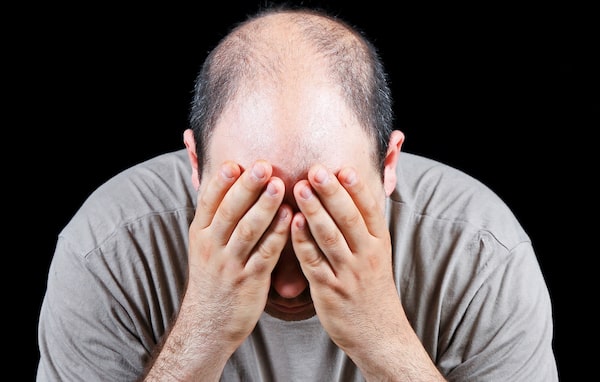Crohn’s and Hair Loss – Learn the Connection
People who suffer from Crohn’s disease experience chronic inflammation in the gastrointestinal (GI) tract since the condition is an inflammatory bowel disease. The inflammation can result in symptoms such as pain, loss of weight and severe diarrhea. In addition, the inflammation can also appear in areas such as the skin and joints. While these symptoms are well-known by the public, it seems that hair loss is also one of the symptoms.

Hair Loss and Crohn’s Disease – How They are Connected
A research review from 2021 suggests there is a connection between inflammatory bowel disease and alopecia areata. This review also suggests the loss of hair might be a more common occurrence in people with inflammatory bowl disease than the general population.
In addition, a 2015 study showed 33% of the study participants reported hair loss as being a symptom of their bowel disease. However, the researchers were not able to prove whether or not each of those hair loss cases were related to inflammatory bowel disease which means the actual percentage has a chance of being smaller than the percentage reported in the study. One of the reasons the researchers were not able to provide a definitive answer is the fact that there are multiple factors that contribute to hair loss. This made it harder to determine whether the hair loss was the result of Crohn’s disease.
Having said that, let’s look at some of the connections between the loss of hair and Crohn’s disease.
Alopecia Areata and Crohn’s Disease
As mentioned above, the 2021 study suggests a link between Crohn’s and alopecia areata which is an autoimmune condition. In an autoimmune condition, the immune system mistakenly attacks the body of the person with the condition. When it comes to alopecia areata, the immune system attacks the hair follicles of the person. Hair follicles that suffer from alopecia areata will fall out and this results in hair loss that is visible as patchy, circular areas on the scalp that are about the size of a coin.
Further research is being conducted on the connection between Crohn’s disease and alopecia areata.
Telogen Effluvium and Crohn’s Disease
In general, telogen effluvium is a thinning condition that can be the result of sudden stress that leads to hair loss. Examples of sudden stress that lead to this type of hair loss include the stress of having surgery or giving birth. Another type of stress that can fall into this category is a flare of the symptoms that are related to Crohn’s disease.
If the Crohn’s disease symptoms are successfully managed to the point that the flare lessens in nature, the hair should begin to grow back on the scalp.
It is not completely understood yet just how prevalent telogen effluvium is in people who have Crohn’s disease, but researchers have associated telogen effluvium with Crohn’ s as well as autoimmune disease overall.
Hair Loss Medications and Crohn’s Disease – Is There a Connection?
There are some cases where hair loss could be a side effect to a medication known as methotrexate. According to the Arthritis Foundation, this medication is the Crohn’s medication that is most often associated with the loss of hair on the scalp. The medication fights inflammation by interfering with the growth of cells. In addition, it has been shown to interfere with hair follicle growth and this can result in some loss of hair on the scalp.
Hair Loss and Crohn’s Disease – Possible Solutions
Crohn’s patients who are experiencing thinning hair or balding on the scalp should contact their doctor to learn more about possible solutions for the issue. One of the most common solutions is adjusting the dosage of medicine the patient is taking and perhaps even the type of medication.
The scalp should also be examined by a board-certified doctor who is experienced in identifying the reasons for hair loss as well as devising treatment plans to address and reverse the issue of hair loss. The doctor can discuss the reasons for the hair loss and provide the patient with an action plan to treat the loss of hair on the scalp.
Some patients might be ideal candidates for oral or topical medications that can help to stimulate the growth of hair and these medications include minoxidil and finasteride. Patients do need to be aware of the fact the results gained from minoxidil, and finasteride will only last as long as the medication is used by the person on a regular basis. These medications require a lifetime commitment as any gains made from their use will start to disappear once they are not used on an ongoing basis.
The ideal treatment for the loss of hair might be a hair transplant. The surgeon will take donor hair (usually from the back and sides of the scalp) and transplant the hair grafts into the area of the scalp where the hair loss has occurred. A hair transplant is a permanent hair loss solution, and the final results are natural in appearance.